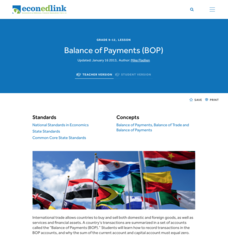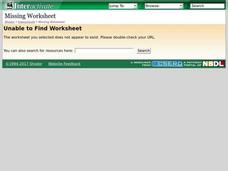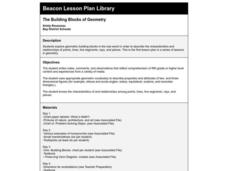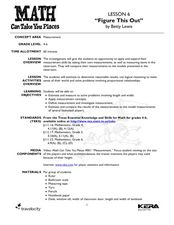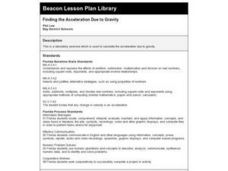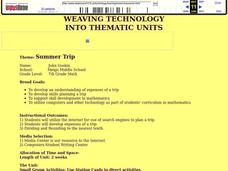Curated OER
Race and Gender in the Media
Students analyze race and gender in the media. In this algebra lesson, students apply their knowledge of percents and ratios to determine the representation of race and gender in the media. They discuss and graph their data.
Council for Economic Education
Balance of Payments (BOP)
Have you ever checked your clothes to see how many nations created them? Pupils take a deeper look at international trade and the balance of payments nations have with one another. They use calculations, simulations, and primary sources...
College Board
2018 AP® Calculus BC Free-Response Questions
Don't just rely on the textbook. Released items from the AP Calculus BC provide pupils and teachers insight on how topics appear on the exam. The six items are divided into calculator and non-calculator sets with half of them also...
Federal Reserve Bank
Cash Flow and Balance Sheets
What is your car worth? How much do you owe? Individuals create their personal cash flow and balance sheets. They learn the difference between an asset and liability using their personal information to complete the activity.
Curated OER
Caldecott Medal Winners
Second graders identify Caldecott Medal winners. In this library media lesson plan, 2nd graders view an overhead transparency of Caldecott Medal winners from 1987-2004 and answer questions based on the data that is displayed.
Charleston School District
The Line of Best Fit
If it's warm, they will come! Learners find a line of best fit to show a relationship between temperature and beach visitors. Previous lessons in the series showed pupils how to create and find associations in scatter plots. Now,...
College Board
2009 AP® Calculus AB Free-Response Questions Form B
Get a free peek into a calculus exam. Released free-response items from the AP® Calculus AB exam provide teachers and pupils examples of how topics may appear. The six questions cover topics such as growth rates, volumes of rotations,...
College Board
2011 AP® Calculus AB Free-Response Questions Form B
Half are real-world. The 2011 AP® Calculus AB free-response questions let pupils and teachers see how content appears on the exam. Half of the questions contain real-world context, and four items do not allow calculators. Real-world...
Curated OER
New York City Delights: The Taxi Cab
You set the rate! Step into the shoes of a taxi driver in New York City, and also pretend to be a person who uses taxis to get around town. The class will conduct collaborative research to learn about the history of taxis. Then, they...
Curated OER
Using Graphical Displays to Depict Health Trends in America's Youth
Identify the different types of graphs and when they are used. Learners will research a specific health issue facing teens today. They then develop a survey, collect and analyze data and present their findings in class. This is a...
Curated OER
Multiplying Decimals Worksheet
For this math worksheet, students view the "Multiplying Decimals and Mixed Numbers" lesson found at www.shodor.org. Students choose their own number to work with and make predictions about results.
Curated OER
Design Explorations: Frieze Patterns
Students will explore frieze patterns. A frieze pattern is a mathematical concept to classify designs on two-dimensional surfaces, which are repetitive in one direction, based on the symmetries in the pattern. They will explore examples...
Curated OER
Does it Measure Up?
Use this fun activity with youngsters learning how to use rules for measurement. Each is provided with six steps that direct them to draw specific things with specific heights or lengths. For example, they start by drawing a tree that is...
Curated OER
The 3R's: Rights, Rules, and Responsibilities
Eighth graders complete seven work stations that highlight math activities while they focus on the rules for Internet use and classroom rules for working in cooperative groups. After completing the activities, they complete a self-...
Curated OER
The Building Blocks of Geometry
Fifth graders explore geometric building blocks in the real world in order to describe the characteristics and relationships of points, lines, line segments, rays, and planes. This is the first lesson plan in a series of lessons in...
Curated OER
Looking for More Clues
Fifth graders explore how to collect data and display it on a bar and circle graph.
Curated OER
Figure This Out
Learners measure different parts of the human body. In this measurement lesson, students work in pairs to take measurements of human measurements which include: arm span, height, foot length, and wrist to longest finger. They also...
Curated OER
Why People Trade
Students explore the role of government in the economy market. In this economics lesson, students analyze the decision making and how it takes into consideration additional cost, benefits and public awareness of what they are trying to...
Curated OER
Geometry Slideshow
Sixth graders create slideshows of geometric terms. They use images taken with digital cameras or scanned from magazines.
Curated OER
Graphs
Middle schoolers investigate circle and bar graphs. In this middle school mathematics lesson, students determine which kind of graph is suitable for a given situation and create circle and bar graphs.
Curated OER
Classifying and Constructing Corners
Fifth graders, after seeing Honeycomb examples, complete a Classifying Angles worksheet, Clock worksheet, and Defining Angles worksheet.
Curated OER
Building a Scale Model
Third graders create a model of the solar system. In this solar system lesson, 3rd graders create a scale model of the solar system. Working in pairs students solve mathematical problems to correctly measure the distance each planet is...
Curated OER
Summer Trip
Seventh graders utilize the Internet for use of search engines to plan a trip. They research and develop expenses for a trip and divide and round the cost of things to the nearest tenth.

